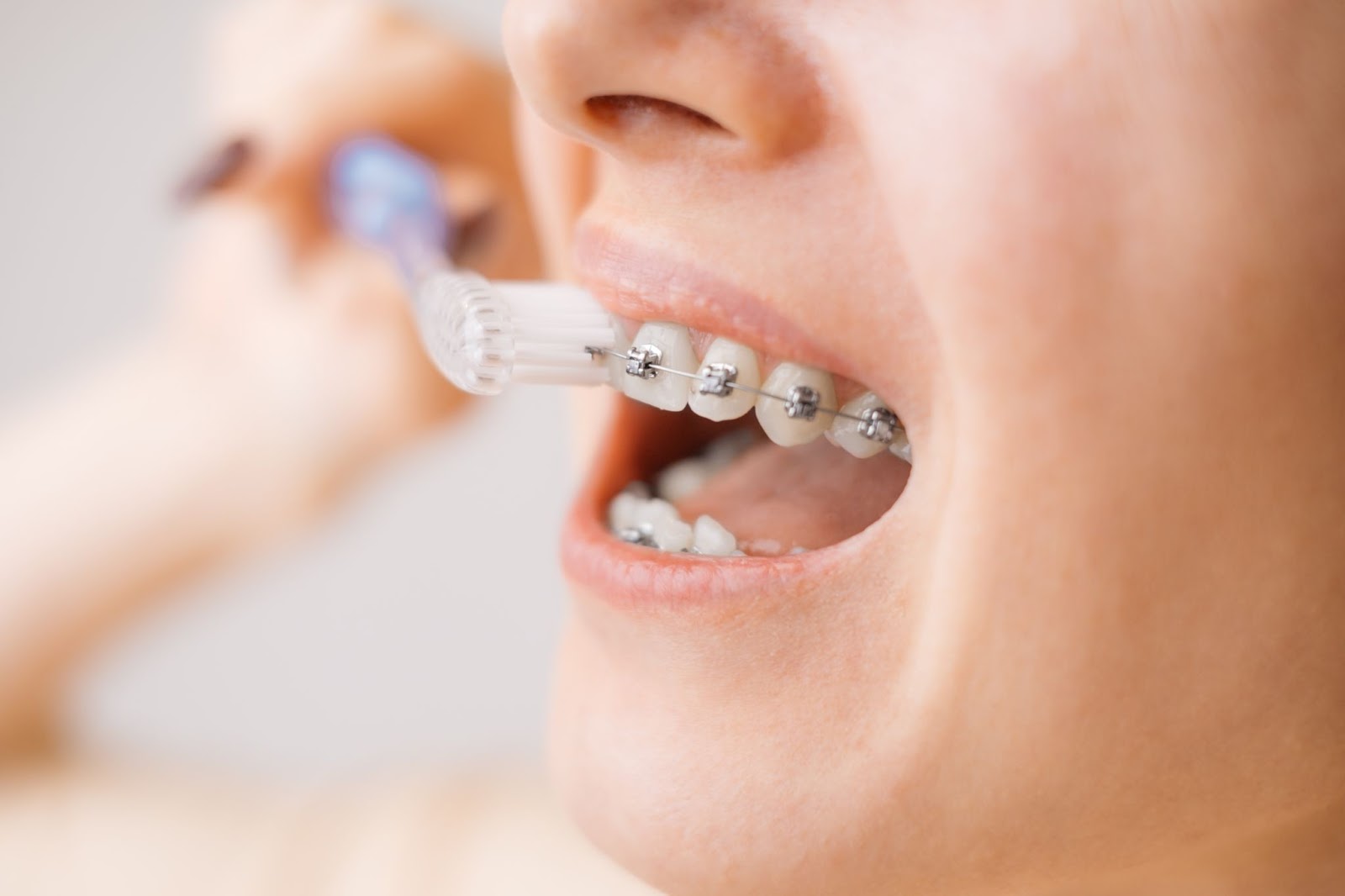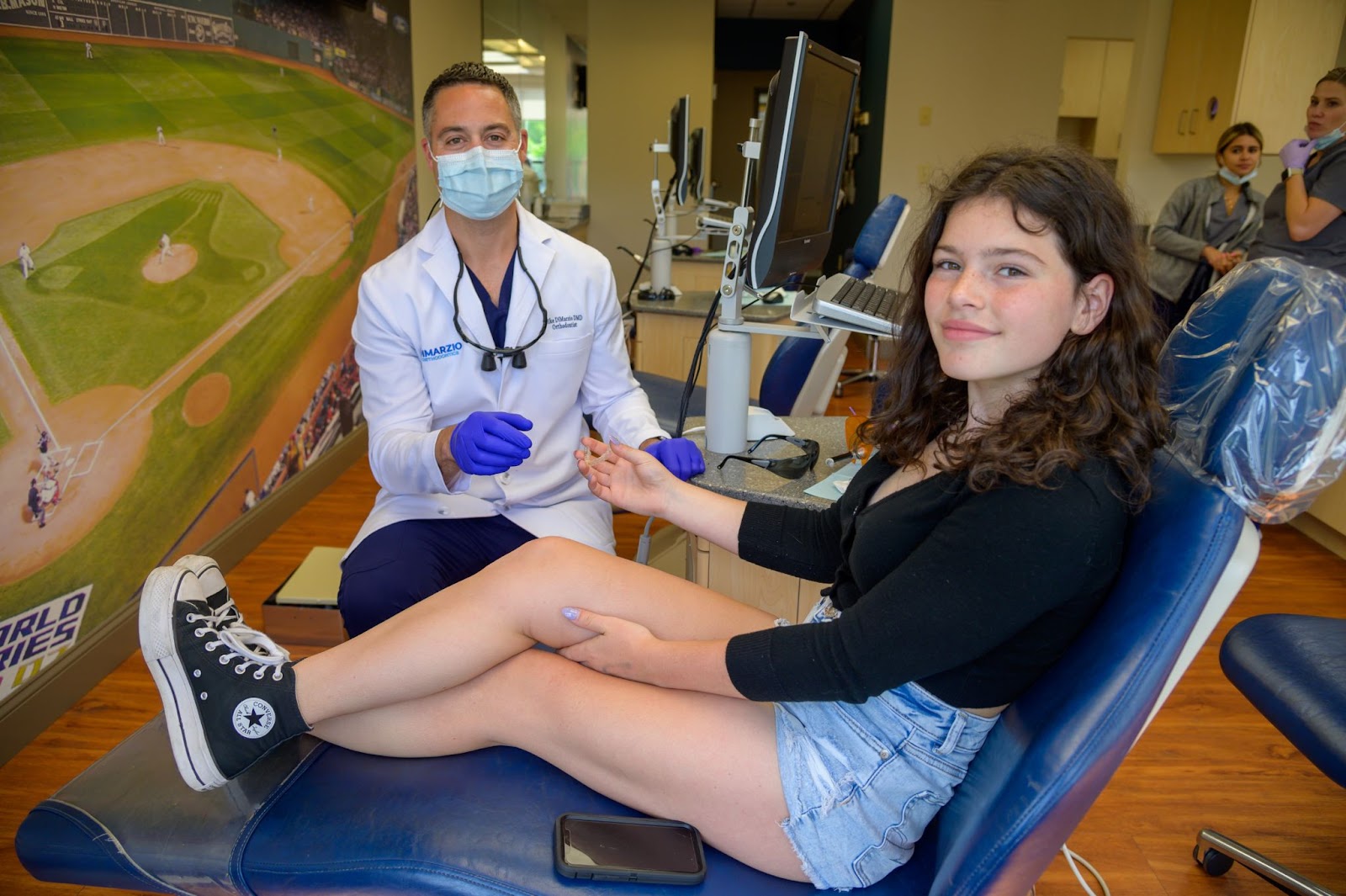If you or your child has braces, you probably already know how important brushing is for keeping your smile healthy! But brushing with braces takes a little extra effort. At DiMarzio Orthodontics, we want to make sure our patients in Quincy, Braintree, and Milton, MA, feel confident about maintaining excellent oral hygiene throughout their orthodontic journey.
Why Brushing With Braces Matters
Braces create lots of new small spaces between your teeth, as well as around brackets and wires, where food particles and plaque can hide. If they aren’t properly cleaned, these areas can lead to:
- Cavities
- Gum inflammation
- White spot lesions (permanent decalcified spots on your teeth)
- Bad breath
- Prolonged treatment time
Staying consistent with brushing is one of the most important parts of successful orthodontic treatment.
Brushing Guide: How to Brush With Braces
Our team suggests following this step-by-step guide to make sure you’re brushing correctly with braces:
- Rinse first. Before brushing, rinse your mouth with water to dislodge loose food particles.
- Use the right toothbrush. Choose a soft-bristled toothbrush or an electric toothbrush with an orthodontic head.
- Brush at an angle. Hold the toothbrush at a 45-degree angle above and below each bracket. Brush gently in small circles.
- Clean all sides. Brush the front, top, and bottom of each bracket and wire. Make sure you’re reaching the gumline, too.
- Don’t forget your tongue! Bacteria love to hide here, so give it a gentle brush.
- Brush for two full minutes. Spend at least 30 seconds on each quadrant of your mouth.
- Rinse and inspect. After brushing, rinse again and check in the mirror to make sure you didn’t miss any spots.
Supporting Kids Brushing With Braces
When your child gets braces, brushing their teeth can suddenly become a lot more complicated. As a parent, your support can make all the difference. Here are some ways to help:
- Supervise brushing time. Younger kids may need guidance to ensure they’re brushing thoroughly, especially around brackets and wires.
- Use plaque disclosing tablets. These reveal missed spots and turn brushing into a learning opportunity.
- Set a timer. Two minutes can feel like forever! Use a timer or a fun brushing app to help kids stay on track.
- Try electric toothbrushes. These can improve effectiveness and make brushing feel less like a chore.
- Build a routine. Consistency is key. Encourage brushing after breakfast and before bed, and after meals when possible.
Remember, good brushing habits now will set your child up for a lifetime of healthy smiles. If you ever need additional support or advice, don’t hesitate to reach out to Dr. Marczak or Dr. DiMarzio!

Frequently Asked Questions About Brushing With Braces
Q: How often should I brush my teeth with braces? You should brush at least three times a day—after breakfast, after lunch (or after school), and before bed. If possible, brush after snacks as well.
Q: What kind of toothpaste should I use with braces? Use a fluoride toothpaste to help strengthen enamel and prevent cavities. Avoid whitening toothpaste, as it can cause uneven coloring when your braces are removed.
Q: Can I use mouthwash with braces? Yes! An alcohol-free, fluoride-based mouthwash can help clean areas that brushing might miss and keep your gums healthy.
Q: Are there special tools that help with brushing with braces? Definitely! We might discuss or suggest some of the following for you:
- Interdental brushes: Tiny brushes that fit between brackets and under wires
- Floss threaders or orthodontic flossers: Make flossing easier
- Water flossers: Great for flushing out debris around braces and gumlines
- Fluoride mouth rinses: Help strengthen enamel and prevent cavities
Q: What happens if I don’t brush properly with braces? Neglecting your brushing routine can lead to several negative dental conditions, but ultimately, it may also extend your treatment time.
Q: Are there foods that make brushing more difficult? Sticky, hard, and chewy foods—like gum, caramel, popcorn, and chips—can cling to your braces and make cleaning more difficult. Avoid these foods to reduce buildup and make your oral hygiene routine easier and more effective.
Q: Can brushing too hard damage my braces? Yes. Brushing too aggressively can wear down enamel, irritate your gums, and potentially loosen or damage brackets. Always use gentle pressure and soft bristles to clean your teeth and braces properly without causing harm.

A Better Way to Brush
One of the most important aspects of having braces is knowing how to maintain your oral hygiene with them. It can take some practice and getting used to, but it’s the best way to make sure your smile looks great when your appliance finally comes off. We’d love to talk more with you about orthodontic treatment in Quincy! Contact us to schedule your free consultation today!

